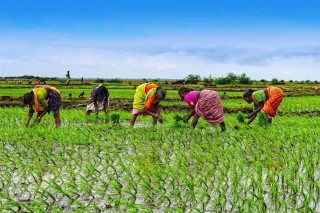Michelle Bachelet, the former Executive Director of the UN Women, once said: “When women are empowered and can claim their rights and access to land, leadership, opportunities and choices, economies grow, food security is enhanced and prospects are improved for current and future generations”.
In an essay written by Saquina Mucavele of the MuGede cooperative in Mozambique, she emphasized the positive influence African women can wield in agriculture on the continent, if given the chance at full land ownership. According to her, women comprise the largest percentage of the workforce in the agricultural sector, but do not have access to or, control over land and productive resources.
Rural African women who are mostly farmers, oftentimes, cannot exercise full rights over their farm produce or even the land they farm on. However, the narrative is gradually changing with the emergence of several groups (mostly rural based) which are actively involved in giving African rural women, food justice. A few of them are outlined below:
We Are The Solution, West Africa
This group is a gathering of several women from a few West African countries (Senegal, Burkina Faso, Mali, Ghana and Guinea) led by Mariama Sanko. This group is mostly concerned with empowering women in the aspect of agriculture and land ownership on the continent. According to Toward Freedom’s interview with Mariama Sanko, We Are The Solution has three main objectives which include the use and promotion of traditional knowledge transmitted from generation to generation, supporting food sovereignty and the preservation of peasant farming (small-scale farming for subsistence as well as for sale in the market). It also aims to restore national policies that are favorable to agro-ecological (protection of nature) peasant farming as well as the promotion of African agricultural production.
All these objectives are embedded in their promotion of ancestral knowledge in the aspect of farming. Also, the association seeks to awaken the consciousness of rural women to the importance of family farming and the employment of traditional agricultural processes and the rejection of chemically aided agriculture which, in the long run, proves to be harmful to the consumers.
Maruzi Beekeeper’s Association (MBA), Uganda
This association started with one woman’s interest in farming diversification and innovation. Previously a beef farmer, Rose Akaki decided to try her hands at modern bee keeping practices and influenced others to do the same. Now, the association has extended beyond a neighborhood gathering to a regional association and together, they market a finished product from their bee keeping efforts, ‘GO Honey’. At a United Nations event titled ‘Empowering Rural Women through Agricultural Innovation’ in 2014, Rose Akaki said she went into bee keeping mainly to address four main challenges Ugandan women farmers go through: Difficulty in accessing markets for their products, Access to and ownership of land, Limited access to credit and the Lack of advisory services. All these challenges according to her, are being tackled within the MBA on a small scale.
African Women in Agricultural Research and Development (AWARD), Africa
While there is a lot of attention on the empowerment of women to be capable and independent farmers and land owners on the continent, AWARD represents empowerment in the aspect of knowledge. Their core objective is to raise and sustain adequate interest and knowledge in African women in the field of science and agriculture, by providing fellowships in that regard. According to the AWARD website, African agriculture is bleeding human capital in developing female researchers and this, if tackled, will speed up Africa’s green revolution. They emphasize that the science, technology, and innovation capacity of Africa would be strengthened through greater participation of its women.
Women Accessing Realigned Markets (WARM), sub-Saharan Africa
The Women Accessing Realigned Markets (WARM) was first set up in Mozambique and Malawi, financed by the Bill and Melinda Gates Foundation and pilot tested by the Food Agriculture and Natural Resources Policy Analysis Network (FANRPAN). The group was set up with the single purpose of policy advocacy which is bringing women farmers and policy makers together, giving women the opportunity to voice their challenges and policy makers the opportunity to implement agricultural friendly policies for the farmers. According to a paper by Dr. Lindiwe Majele Sibanda, WARM has, so far, demonstrated how a combination of logistical, cultural, and economic factors, coupled with a lack of gender statistics in the agricultural sector, led to the creation of programmes which fail to fully appreciate women’s specific needs. The same paper suggests that the practical approach by WARM towards policy advocacy is the Identifying partners that can link women farmers to markets and help women’s groups to start participating fully in agricultural value chains.








